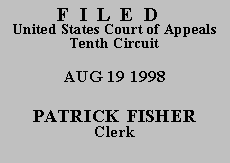

| UNITED STATES OF AMERICA,
Plaintiff-Appellee,
v.
JEFF MCMILLAN, also known as
Trim-Dog Defendant-Appellant. |
No. 97-1369
(D.C. No. 94-CR-254-M) (Colorado) |
Jeff McMillan was convicted of one count of possessing "cocaine base" with intent to distribute in violation of 21 U.S.C. § 841(a)(1) and (b)(1)(A)(iii), and one count of carrying a firearm during and in relation to a drug trafficking crime in violation of 18 U.S.C. § 924(c). The district court imposed a sentence of 211 months, 151 months for the drug offense and 60 months for the section 924(c) conviction. On appeal, we affirmed the section 841 conviction and remanded the section 924(c) conviction in light of Bailey v. United States, 516 U.S. 137 (1995). See United States v. McMillan, Nos. 96-1054, 96-1076, 1997 WL 413252 (10th Cir. July 23, 1997). On remand, the government chose not to retry the section 924(c) charge and requested resentencing on the drug conviction. Pursuant to the weapon enhancement provision of U.S.S.G. § 2D1.1(b)(1),
Mr. McMillan's sentence was increased two levels, from 151 to 188 months. Mr. McMillan appeals, and we affirm.
Mr. McMillan contends that the district court lacked the authority to enhance the sentence on the section 841 conviction. Specifically, he argues that the district court violated the mandate of this court in enhancing his sentence because the language of the order did not specifically remand for a sentence enhancement. However, in a virtually identical case we held that district courts do not require specific resentencing authorization. See United States v. Hicks,
F.3d , 1998 WL 300052, at *2 (10th Cir. June 9, 1998) (defendant resentenced under weapons enhancement provision of guidelines after Bailey remand). Rather, the district courts maintain the "'inherent discretionary power' to resentence a defendant on the remaining counts de novo unless we impose specific limits on the court's authority to resentence. Simple commands such as 'vacate,' 'set aside,' and 'affirm' are not sufficiently specific to limit that power." Id. at *4 (citation omitted).
The language of our mandate did not specifically limit the district court's authority to resentence Mr. McMillan.
AFFIRMED.
ENTERED FOR THE COURT
Stephanie K. Seymour
Chief Judge
*.This order and judgment is not binding precedent, except under the doctrines of law of the case, res judicata, or collateral estoppel. The court generally disfavors the citation of orders and judgments; nevertheless, an order and judgment may be cited under the terms and conditions of 10th Cir. R. 36.3.